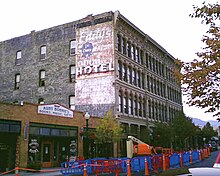
A ghost sign is an old hand-painted advertising sign that has been preserved on a building for an extended period of time. The sign may be kept for its nostalgic appeal, or simply indifference by the owner.
History and preservation


Ghost signs are found across the world with the United States, the United Kingdom, France and Canada having many surviving examples. Ghost signs are also called fading ads or brickads. In many cases these are advertisements painted on brick that remained over time. Old painted advertisements are occasionally discovered upon demolition of later-built adjoining structures. Throughout rural areas, old barn advertisements continue to promote defunct brands and quaint roadside attractions.
Many ghost signs from the 1890s to 1960s are still visible. Such signs were most commonly used in the decades before the Great Depression.
— Kathleen Hulser, New York Historical Society.evoke the exuberant period of American capitalism. Consumer cultures were really getting going and there weren't many rules yet, no landmarks preservation commission or organized community saying: "Isn't this awful? There's a picture of a man chewing tobacco on the corner of my street."
The painters of the signs were called "wall dogs". As signage advertising formats changed, less durable signs appeared in the later 20th century, and ghost signs from that era are less common.
Ghost signs were originally painted with oil-based house paints. The paint that has survived the test of time most likely contains lead, which keeps it strongly adhered to the masonry surface. Ghost signs were often preserved through repainting the entire sign since the colors often fade over time. When ownership changed, a new sign would be painted over the old one.
In 2013, conservators undertook an effort to preserve ghost signs in Philadelphia.
In the city of Detroit, well-preserved ghost signs have been uncovered when an adjoining building is demolished as part of the city's blight-fighting efforts.
Gallery
-
 Sign in Renfrew Street, Glasgow (Scotland)
Sign in Renfrew Street, Glasgow (Scotland)
-
 Former Kaffee-Ausschank, Görlitz (Germany)
Former Kaffee-Ausschank, Görlitz (Germany)
-
 Pewex advertisement, Łódź (Poland)
Pewex advertisement, Łódź (Poland)
-
 Sign for a defunct clothing store in Salem, Massachusetts (USA)
Sign for a defunct clothing store in Salem, Massachusetts (USA)
-
 Former Kaffee-New York, Transylvania (Romania)
Former Kaffee-New York, Transylvania (Romania)
-
 Old advertisements forming a "palimpsest", Paris (France)
Old advertisements forming a "palimpsest", Paris (France)
-
Sign for "David Ritchie & Son. Millers", Launceston, Tasmania (Australia)
-
 Ghost sign for MR Masło, a butter company, in Poznań, Poland
Ghost sign for MR Masło, a butter company, in Poznań, Poland
See also
References
- Roberts, S.; Marshall, G. (2017). "What is a Ghost Sign?". In Schutt, S.; Roberts, S.; White, L. (eds.). Advertising and Public Memory: Social, Cultural and Historical Perspectives on Ghost Signs. New York: Routledge.
- "Ghost Signs - A Waymarking.com Category". www.waymarking.com.
- see Fading Ad Gallery
- see Ghost Signs
- "Défense D'Af: Faux Ghostsign from John Downer". Ghost Signs (blog). Retrieved 5 May 2016.
- ^ Ghost signs: Old slogans never die in Butte..., The Montana Standard (Butte, Montana). August 9, 2001. Accessed September 6, 2007.
- Stage, Wm. (1989). Ghost Signs: Brick Wall Signs in America. Floppinfish Pub Co. ISBN 978-0911380842.
- ^ Joseph Berger. "Fading Memories". New York Times. November 5, 2005. Retrieved on October 5, 2009.
- Genovese, Peter (March 30, 2012), "Ghost signs: Jersey's commercial history is written large in faded paint on city buildings", The Star-Ledger, retrieved 2012-03-30
- Matheson, Kathy (May 12, 2013). "Painters brush new life into Philadelphia's 'ghost signs'". Associated Press. Retrieved May 13, 2013.
- Allen, Robert. "'Ghost signs' expose Detroit's faded history". Detroit Free Press.
- Barry, Dan (January 23, 2012). "In a City Fighting Blight, 'Ghost Signs' as Portals to a Bygone Era". The New York Times.
Further reading
- Harvey, A. D. (1999). "Painted advertisements in Islington". Transactions of the London and Middlesex Archaeological Society. 50: 153–161.
External links
- Ghost signs from Canada & the US
- Ghost Ads at Lileks.com
- UK Ghost Signs
- Ghost adverts on Heritageandhistory.com
- Leading Ghost Signs Article
- Facebook page featuring British and Irish ghost signs
- Liverpool Ghost Signs - The first British ghost signs book
- Painted signs and mosaics - A record of ghost signs from the UK, France, Germany and a few other countries
- American Ghosts - Ghost Signs of the United States
- Dublin Ghost Signs - Capturing Dublin's history through its old and fading signs
- Ghost Signs of Louisville – from the University of Louisville Libraries